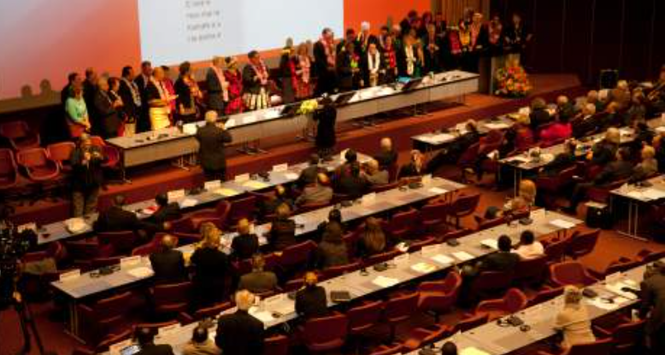
From 28 November to 1 December, some 1800 delegates gathered in Geneva to debate and seek solutions for some of the world’s most pressing humanitarian challenges. Meeting only once in every four years, the International Conference of the Red Cross and Red Crescent is a major event on the humanitarian calendar. This year, the Conference was attended by heads of state, and government and senior-level representatives of government and the Red Cross and Red Crescent Movement from every corner of the globe. Numerous other humanitarian organizations and the UN system also participated as observers.
Building on the momentum of the 30th International Conference in 2007, the Conference again this year took up the subject of disaster laws – specifically addressing three sub-themes:
• Strengthening legal preparedness for international disaster response, including implementation of the IDRL Guidelines
• Enhancing disaster risk reduction at the community level through legislation
• Addressing regulatory barriers to the rapid and equitable provision of emergency and transitional shelter after disasters
The Conference dedicated one afternoon to examining these sub-themes in plenary, and adopted a single consensus resolution on the topic.
During the plenary, participants heard from a number of featured speakers, each presenting fresh insights and perspectives. Ed Schenkenberg, Executive Director of the International Council of Voluntary Agencies (ICVA), recognised that clear legal frameworks can both ease relief operations and help ensure the quality of assistance provided by international NGOs in the aftermath of natural disasters. He called on governments that have not already done so to make use of the IDRL Guidelines to prepare their domestic laws for the receipt of international disaster assistance.
M. Idrees Mahsud, Director of Pakistan’s National Disaster Management Authority, speaking from his country’s recent experience with large-scale displacement caused by the historic flooding of 2010 and 2011, emphasized the provision of shelter as a key humanitarian priority. “Disaster managers in most countries of the world face challenges related to regulatory barriers, non-existence of regulation in certain cases and also issues related to implementation of such regulations, which hinders provision of shelters to those affected – and Pakistan is no exception.” He welcomed the opportunity of the Conference to promote the sharing of experience, support and technical assistance in order to remove regulatory barriers to shelter on a priority basis.
Participants also engaged in a rich discussion, during which they shared their experience and the steps they are taking at home to improve their domestic legislation for disaster risk reduction and response.
Legal preparedness for international disaster response
The Conference’s adoption of the IDRL Guidelines in 2007 resulted in significant advances in legal preparedness for international disaster response. In the last four years, several states have adopted new laws modelled or drawing on the IDRL Guidelines, and many more are in progress. Advances have also been made at the regional level, where regional organisations and groupings of states are using the IDRL Guidelines to develop and strengthen their cooperation mechanisms.
But large gaps remain, and many states remain under-prepared to manage the common regulatory issues of international disaster response operations. This year, the Conference took stock of progress in the implementation of the IDRL Guidelines, recognised effort to develop a new tool to assist states in incorporating the IDRL Guidelines in their legal frameworks. The Model Act for the Facilitation and Regulation of International Disaster Relief and Initial Recovery Assistance”, developed in partnership by the IFRC, OCHA and the Inter-Parliamentary Union is currently available in a pilot version.
Legislation for enhanced disaster risk reduction
The importance of strong legal and institutional frameworks for disaster risk reduction is widely recognised – including in previous resolutions of the International Conference and Priority Action 1 of the Hyogo Framework for Action. Moreover, research shows that legislation can boost risk reduction impacts at the community level where progress is lagging most behind.
But guidance on just what constitutes good or effective legislation is surprisingly scant. The Conference is addressing this gap, encouraging states with support from their National Societies, the IFRC and other relevant partners to review their existing legislation against a list of key elements.
Regulatory barriers to shelter
In the aftermath of a disaster, shelter is essential to the health and security of people affected. It is critical to restore dignity and to allow families to begin rebuilding their lives and livelihoods. Too often, however, regulatory obstacles impede the timely and equitable provision of emergency and transitional shelter. Issues such as lack of clarity in the ownership of land and property or building codes not suited to the emergency context can cause delays or create discrepancies in the assistance given.
Much attention has been given to long-term aspects of housing, land and property rights issues. But until long-term solutions can be put into practice, action is needed to ensure that the immediate shelter needs of people displaced by natural disasters are adequately met. The Conference called attention to the need to find practical solutions for the emergency and transitional phases. It also called upon states, the Red Cross and Red Crescent Movement and other humanitarian organizations to make every effort to assure equity in their shelter assistance.
For more information on the International Conference, visit the website at www.rcrcconference.org
For information about the disaster laws topics to be addressed by the Conference, see the following documents and reports available on the IFRC website at www.ifrc.org/en/what-we-do/idrl/meetings-and-events/past-events/disaster-law-at-the-31st-international-conference/
• Resolution on strengthening normative frameworks and addressing regulatory barriers concerning disaster mitigation, response and recovery
• Background report on progress in the implementation of the Guidelines for the domestic facilitation and regulation of international disaster relief and initial recovery assistance
• Background report on law and disaster risk reduction at the community level
• Background report on addressing regulatory barriers to providing emergency and transitional shelter in a rapid and equitable manner after natural disasters